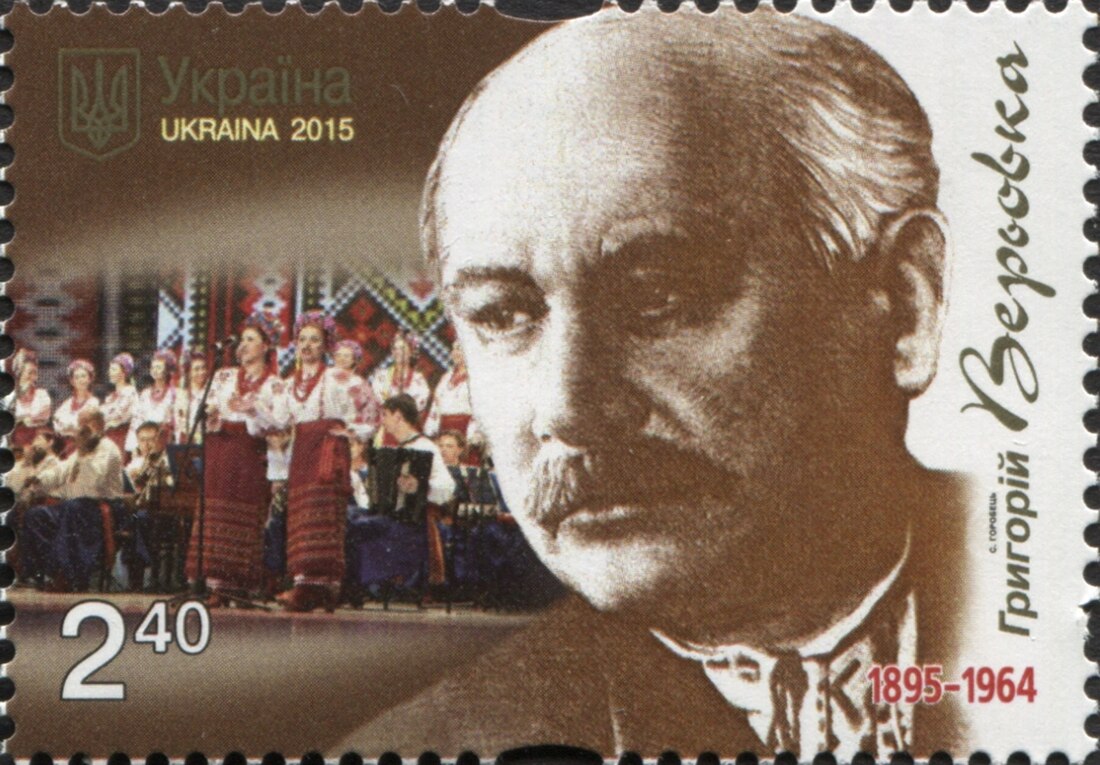Hryhoriy Veryovka
Ukrainian composer From Wikipedia, the free encyclopedia
Hryhoriy Huriyovych Veryovka[a] (25 December 1895 [O.S. 13 December] – 1 October 1964) was a Soviet and Ukrainian composer and choir director.[2][3]
Hryhoriy Veryovka Григорій Верьовка | |
|---|---|
 Veryovka on a 2015 Ukrainian stamp | |
| Background information | |
| Born | 25 December 1895 [O.S. 13 December] Berezna, Chernigov Governorate, Russian Empire (present-day Ukraine) |
| Died | 21 October 1964 (aged 68) Kiev, Ukrainian SSR, Soviet Union |
| Genres | Classical |
| Occupations | |
| Spouse | Eleonora Pavlivna Skrypchynska[1] |
He is best known for founding the renowned Veryovka Choir in 1943, and leading it for many years, gaining international recognition and winning multiple awards.[4] Veryovka was also a professor of conducting at the Kyiv Conservatory, where he worked alongside faculty including Boleslav Yavorsky, Alexander Koshetz, Mykola Leontovych, and Mykhailo Verykivsky.[5]
Career
Veryovka was born in an old Cossack town of Berezna (today urban-type settlement).[2] In 1916 he graduated from the Chernihiv Theological Seminary.[6] In 1918–21 Veryovka studied at the Lysenko Music and Drama School (a predecessor of the Kyiv Conservatory) studying a musical composition by Boleslav Yavorsky,[7] conducting by Aleksander Orlov. In 1933 he received an external degree from the institute.[8]
From 1923 to 1927 Veryovka continued to work at the Lysenko Institute and later from 1931 to his death at the Kyiv Conservatory.[9] During World War II in 1941–45 he was a scientist of the Rylsky Institute of Art Studies, Folklore and Ethnology.
In 1943 in Kharkiv, Veryovka organized his well known choir and until his death was its art director and a main conductor.[4] In 1948–52 he headed the National Union of Composers of Ukraine.[10][11]
Upon his death in 1964 he was buried in Baikove Cemetery in Kyiv, and in 1967 a monument was erected at the site of his burial in his honor.[12]
Awards and honors
- He was awarded the Stalin Prize in 1948.[2]
- He was awarded the People's Artist of the Ukrainian SSR in 1960.[13]
- He was awarded the Shevchenko National Prize in 1968.[13]
- There are streets named after him in Kyiv[14] and Bucha.[15]
Notes
References
Wikiwand - on
Seamless Wikipedia browsing. On steroids.
